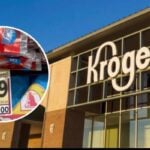A monthlong Consumer Reports (CR) investigation alleges that shoppers at almost half of Kroger-owned grocery stores are overcharged for sale items. The investigation began after CR learned that Kroger workers in Colorado alleged widespread errors in pricing labels during union negotiations.
In an effort to document the "size and breadth of the problem," CR recruited people to visit multiple stores in multiple states over several months. The results?
Don’t miss
- I’m 49 years old and have nothing saved for retirement — what should I do? Don’t panic. Here are 6 of the easiest ways you can catch up (and fast)
- Robert Kiyosaki warns of a ‘Greater Depression’ coming to the US — with millions of Americans going poor. But he says these 2 ‘easy-money’ assets will bring in ‘great wealth’. How to get in now
- Gain potential quarterly income through this $1B private real estate fund — even if you’re not a millionaire. Here’s how to get started with as little as $10
“The shoppers found expired sales labels that led to overcharges on more than 150 grocery items, including Cheerios cereal, Mucinex cold and flu medication, Nescafé instant coffee, boneless beef, salmon, and dog food,” the report stated.
How widespread is the issue?
According to the report, CR recruited people to visit 26 Kroger stores — including Kroger, Harris Teeter, Fred Meyer, Fry’s and Ralphs — across 14 states and the District of Columbia during March, April and May 2025.
Shoppers documented more than 150 items where expired or misleading sales tags could have caused customers to pay more at checkout than the price listed on the shelf. Roughly one-third of the tags were outdated by at least 10 days, and several, they say, expired months before.
The average overcharge was $1.70 per item — or, 18.4% more than the advertised sale price.
“People should pay the price that is being advertised, that’s the law,” Consumer World founder Edgar Dworsky told CR.
“The issue here is that shoppers can’t rely on the shelf price being accurate, and that’s a big problem.”
Items affected included a range of household staples and name-brand goods such as cereal, medication, instant coffee, meats, seafood and pet food. In some cases, the shelf tags still displayed promotional pricing well after the sale had ended, potentially misleading shoppers into thinking they were getting a discount.
One example, KTLA News reports, was an 8-pack Mission Flour Tortillas advertised as on sale for $2.99 but showing as $4.00 when the CR shoppers checked their receipts.
A Kroger representative responded to the report, saying the company regularly checks prices for accuracy and called the CR report a “few dozen examples across several years out of billions of customer transactions annually.” The company said that while no errors are acceptable, characterizing a few mistakes as "widespread pricing concerns" is false.
While Kroger is the latest retailer to come under scrutiny, it’s not the only one. Other chains, including Walmart and Vons, have faced similar accusations in recent months. In October 2024, Albertsons agreed to pay $4 million to settle a lawsuit that accused the California grocery chain of charging more than the lowest advertised price for various items.
Consumer advocates say the issue may be more common than most shoppers realize, and without checking receipts and shelf tag dates, many overcharges can easily go unnoticed.
Read more: Want an extra $1,300,000 when you retire? Dave Ramsey says this 7-step plan ‘works every single time’ to kill debt, get rich in America — and that ‘anyone’ can do it
How to avoid being overcharged on your groceries
While price errors may not be intentional, they can still cost you money — especially if you’re buying multiple items you thought were on sale. Consumer advocates say overcharges often go unnoticed, but with a few simple steps, shoppers can reduce the risk of paying more than they should.
Here are a few ways to protect yourself at the register:
Double-check your receipt. Review it before leaving the store to ensure sale prices were applied correctly.
Take pictures of sale tags. If you’re concerned something won’t ring up right, take a photo of the tag to show the clerk.
Look for expiration dates on sale tags. Some tags may still be posted even after the promotion ends. Check before you decide to purchase items you think are on sale.
Speak up. If the price at checkout doesn’t match what was listed on the shelf, ask for a correction.
Know the rules. Most states do not have a law that requires stores to honor an expired sale tag. However, some stores will as a gesture of goodwill.
Even major grocery chains can make mistakes, but staying alert can help ensure you’re actually getting the deals you came for.
What to read next
- JPMorgan sees gold soaring to $6,000/ounce — use this 1 simple IRA trick to lock in those potential shiny gains (before it’s too late)
- This is how American car dealers use the ‘4-square method’ to make big profits off you — and how you can ensure you pay a fair price for all your vehicle costs
- Here are 5 ‘must have’ items that Americans (almost) always overpay for — and very quickly regret. How many are hurting you?
- How much cash do you plan to keep on hand after you retire? Here are 3 of the biggest reasons you’ll need a substantial stash of savings in retirement
Like what you read? Join 200,000+ readers and get the best of Moneywise straight to your inbox every week. Subscribe for free.
This article provides information only and should not be construed as advice. It is provided without warranty of any kind.
